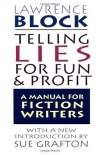Manual For Fiction Writers by Block, Lawrence (classic books to read .TXT) 📗

Book online «Manual For Fiction Writers by Block, Lawrence (classic books to read .TXT) 📗». Author Block, Lawrence
In this instance, I'm lucky I didn't lose the idea altogether. It's important, I think, to keep the idea visible?in a notebook, on a wall chart, whatever. That way you'll jog your memory from time to time, and when an idea or a piece of information comes along that you can use, you'll reach out and incorporate it in the story as it evolves.
When does procrastination become other than creative? When it consists of avoiding work rather than postponing it, and when my alternative to working on Project A is not working at all. Since I'm inherently lazy, I force myself to work on Project B instead.
Another thing?it was Don Marquis who called procrastination the art of keeping up with yesterday, and conscience compels me to give credit where it's due. And pretty soon I'll share with you my thoughts on the subject of Creative Plagiarism.
Perhaps we'll take up that topic next chapter. Perhaps I'll put it off for a while. Meanwhile, though, I've got to go water the philodendron.
CHAPTER 16
Time Out
I'LL TELL you something. The more time I spend in this writing game, the clearer it becomes to me how little I know about it. It's a rare month that goes by without my wondering that I have the temerity to go on writing for a living, let alone offer you out there suggestions as to how you can go and do likewise.
This humility attack is not the product of an insight gained from contemplation. Would that it were. On the contrary, it is the bitter fruit of experience.
Consider if you will the pattern I have established for myself over the past several weeks. Each morning, as is my custom, I awaken around seven. I get out of bed, see my shadow, and dive back into bed, where I contrive to spend the ensuing four hours with the covers pulled over my head and my eyes clenched shut. Because I'm not really tired and have already had plenty of sleep, I have to be quite relentless about this, forcing myself to stay put each time I'm moved to awaken.
Then, round about eleven, I roll out at last and put the teakettle on to boil. By that time it's safe to start the day. I'm a morning writer, and with the morning gone I can proceed directly to the non-writing portion of my day?a meal, a gym workout, a lunch date, a long walk, whatever pleasing prospect presents itself. I don't have to walk into my office, I don't have to look at my typewriter.
I've avoided work for yet another day.
I've won.
I'm not going to dignify this curious behavior by calling it writer's block. I'm not altogether certain what writer's block is, but it seems to take the form of an inability to get anything written however hard one tries. It's painfully clear to me that I have not been trying, that I have indeed done everything in my power to avoid finding out if I am or am not capable of writing by giving my typewriter a wide berth.
Regular readers of my column may well recall how I tend to stress the importance of Keeping at It. The writer who gets things done, I've pointed out, is the writer who shows up for work day in and day out. Regular hours and regular production are the keys to productivity. The hare may show a lot of early form, but the smart money's always on the tortoise.
I've argued, too, that not only one's productivity but the quality of one's work is enhanced by this slow-and-steady modus operandi. When I work every day?or six days a week, say?the book I'm working on stays very much in mind. I think about it during the day and let my subconscious work it over at night. I don't have a chance to lose my grasp of it.
Why, then, don't I start the teakettle going at seven, get to my desk by eight, and nail down the Pulitzer Prize?
I suppose because things don't always go as I would have them go. My best-laid plans, like those of other mice and other men, gang aft agley.
But perhaps a little background on my present situation might be instructive.
Couple of months ago I started work on a very intimidating project, a novel that's rather more ambitious than anything I've undertaken in the past. It's going to be a fairly long book, probably running four to five hundred pages in manuscript, which would make it twice as long as the mysteries I most often turn out. It will also cover a lot of ground temporally and geographically, and although I know the general shape of the plot I have no outline for this book, and don't want one. The plot is going to





Comments (0)